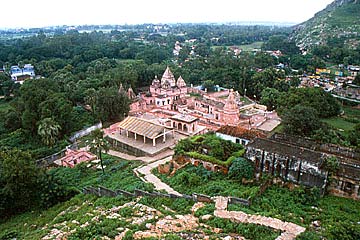 Rajagaha is a city near Benaras, celebrated as the residence of Gautama Buddha.
Rajagaha is a city near Benaras, celebrated as the residence of Gautama Buddha.
Rajagaha also known as Rajgir was a city and a notified area in Nalanda district in the Indian state of Bihar. The city of Rajagaha was the first capital of the kingdom of Magadha, a state that would eventually evolve into the Mauryan Empire. This place has been associated with both the historical Buddha and Mahavira.
Rajagaha means the house of the king or the home of royalty. This was the ancient capital city of the Magadha kings until the 5th century BC when Ajatasatru moved the capital to Pataliputra.
Jarasandha who hailed from this place had been defeated by Krishna seventeen times. Krishna left the battlefield in the eighteenth time without fighting. For this reason Krishna was also called `ranacora` or the one who has left the battlefield.
The epic Mahabharata narrates a wrestling match between Bhima, one of the Pandavas, and Jarasandha, the then king of Rajagaha or Rajgir. Jarasandha was unbeatable as his body could rejoin any dismembered limbs. According to the legend, Bhima split Jarasandha into two and threw the two halves facing opposite to each other so that they could not join.
Rajagaha is a sacred city, which is celebrated in both the religions, Buddhism and Jainism. It was in Rajagaha or Rajgir that Gautam Buddha spent several months meditating, and preaching at Griddhkuta, the Hill of the Vultures. He also delivered some of his famous sermons and converted King Bimbisara of Magadha and countless others to his religion.
Rajagaha was also famous for its association with Shishunaga Kings Bimbisara and Ajatashatru. Ajatashatru kept his father Bimbsara in captivity here.
The First Buddhist Council on one of the hills is the cave of Saptparni was held under the leadership of Maha Kassapa. The Saptparni cave is also the source of the Rajagaha Hot Water Springs that have curative properties and are sacred to the Hindus, Buddhists and Jains.
Jainism states that, Lord Mahavira spent fourteen years of his life at Rajagaha and Nalanda, spending chaturmas, which is four months of the rainy season at a single place in Rajagaha and the rest in the places in the vicinity. Rajagaha or Rajgir was the capital of his favourite shishya or disciple, king Shrenik. Therefore Rajagaha is a very important religious place for the Jains.









